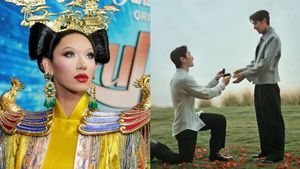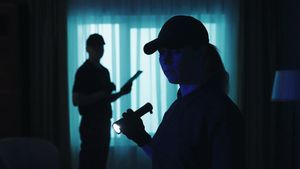
CONTACTAbout UsCAREER OPPORTUNITIESADVERTISE WITH USPRIVACY POLICYPRIVACY PREFERENCESTERMS OF USELEGAL NOTICE
© 2025 Equal Entertainment LLC.
All Rights reserved
All Rights reserved
By continuing to use our site, you agree to our Private Policy and Terms of Use.
The 100th birthday of the late Alan Turing, the gay British mathematician and computer theorist whose work decoding the infamous German Enigma machine is often credited with winning WWII, may have been overshadowed by Pride celebrations in the U.S. today but both Google and researchers in his native country didn't forget.
Today Google honored Turing, who died in 1954 and is often called the father of artificial intelligence, with an animated "Turning machine" Google doodle. A Turing machine, according to PC magazine's Damon Poeter, was not an actual computer but rather "a hypothetical one that still serves as a fundamental tool for understanding how algorithms, computer programming, and computing itself works." (Poeter included clips of Turing's 1948 essay "Intelligent Machinery" which explains this conceptual computer, a fascinating read for math geeks and gay history buffs for sure.)
Meanwhile, at a conference today in Oxford, England, professor Jack Copeland, an expert on Alan Turing, told surprised visitors that Turing's 1954 death was not a suicide, as has widely been assumed. According to a fascinating account in BBC News, Copeland questioned the evidence that was presented at the 1954 inquest into Turing's death, calling it insufficient to rule the death a suicide.
Turing died of cyanide poisoning and a half eaten apple was found near his bed. Legend goes that Turing was fascinated with the fairy tale of Snow White and poisoned himself with an apple to end the persecution he was getting for being gay. But Copeland argues that Turing ate an apple every night before bed (something others knew as well), the apple was never tested for cyanide, and there were no indications anywhere that Turing was anything less than upbeat and forward thinking. He even wrote a to-do list for the next week.
Knowing Turing's history might make it easy to understand suicide, wrote BBC's Roland Pease. After all, in 1952, after he had reported a burglary, the war hero was investigated for "acts of gross indecency" because he had had a male lover in his house. Instead of prison, Turing accepted what was called "chemical castration," essentially hormone treatment to suppress his sexual desire."
But, according to BBC News, Copeland argues that regardless of how horrendous that treatment was, by all accounts Turing took it in stride, often joking about his situation.
Still at the inquest, the coroner who claimed Turing's death a suicide, JAK Ferns, told participants, "In a man of his type, one never knows what his mental processes are going to do next."
deliciousdiane
From our Sponsors
Most Popular
31 Period Films of Lesbians and Bi Women in Love That Will Take You Back
December 09 2024 1:00 PM
18 of the most batsh*t things N.C. Republican governor candidate Mark Robinson has said
October 30 2024 11:06 AM
True
These 15 major companies caved to the far right and stopped DEI programs
January 24 2025 1:11 PM
True
Latest Stories
Out gay Colorado Gov. Jared Polis mocks Donald Trump's 'unflattering painting'
April 02 2025 12:36 PM
Appeals court denies Trump DOJ’s request to halt injunction on trans military ban — for now
April 02 2025 11:00 AM
Here are 11 major companies standing up for DEI
April 02 2025 12:21 PM
Your Lovable Trans Auntie asks, "Where do we go from here?"
April 02 2025 7:00 AM
Trending stories
Recommended Stories for You

Diane Anderson-Minshall
Diane Anderson-Minshall is the CEO of Pride Media, and editorial director of The Advocate, Out, and Plus magazine. She's the winner of numerous awards from GLAAD, the NLGJA, WPA, and was named to Folio's Top Women in Media list. She and her co-pilot of 30 years, transgender journalist Jacob Anderson-Minshall penned several books including Queerly Beloved: A Love Across Genders.
Diane Anderson-Minshall is the CEO of Pride Media, and editorial director of The Advocate, Out, and Plus magazine. She's the winner of numerous awards from GLAAD, the NLGJA, WPA, and was named to Folio's Top Women in Media list. She and her co-pilot of 30 years, transgender journalist Jacob Anderson-Minshall penned several books including Queerly Beloved: A Love Across Genders.












































































